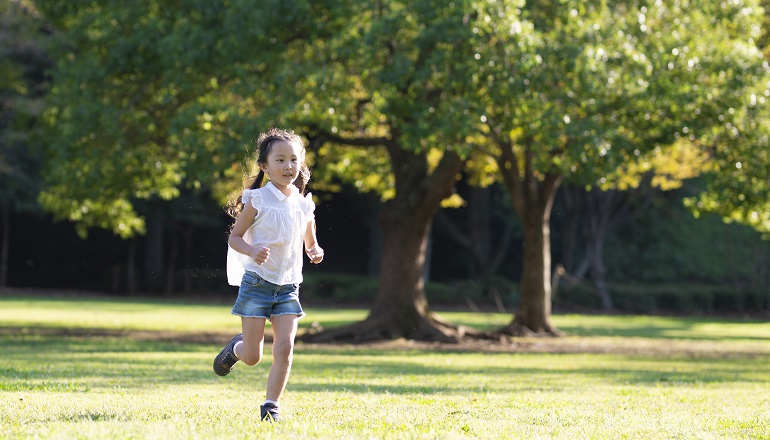Adoptive families come together with full hearts and high hopes. The joy of bringing our children home, the wonderful discovery of who our children are, and the day-to-day pleasures of parenting, all contribute to the fulfillment of our hopes. Yet we can’t help wondering if their lives before they came to us will affect the way our children cope with trials, setbacks, and adversity. How well will they bounce back from bruised knees and broken toys, and from moving to a new town or losing a pet?
It’s all about resilience, the ability to confront and cope with life’s obstacles. Research shows that, for all of us, resilience is part innate, part learned. We’re born with the capacity to rebound from challenges and become competent, purposeful, independent adults. “The study of resilience has a lot of relevance to adoptive families,” says Dee Paddock, a psychotherapist and adoptive mother in Colorado. Adopted kids learn to bounce back the same ways all kids do. Does the loss of birth parents, or time in an orphanage, or too many foster care placements, affect our children? On occasion. But research shows that, with the loving care of a permanent family and flexible temperament, virtually all children are resilient.
Research Confirms That Children Are Resilient
Numerous studies on resilience in children who have faced hardships in early life bear good news for adoptive parents. That research includes a landmark longitudinal study of children on the island of Kauai, by Emmy E. Werner, Ph.D., a human development professor at University of California at Davis, and findings from Children’s Hospital Boston. Ann S. Masten, Ph.D., a professor at the Institute of Child Development at the University of Minnesota in Minneapolis, notes, “The most important protective resource for development is no surprise: It is a strong relationship with a competent, caring adult.” Dr. Masten reports in her paper, “Resilience in Children At Risk,” that, “The most important individual quality is probably normal cognitive development—including average or better IQ scores, good attention skills, and street smarts. Research shows that catastrophic stressors can threaten the integrity of a child’s ability to think and solve problems; but if good parenting (by parent or others) and good cognitive development are sustained, human development is robust, even in the face of adversity.”
Patty Cogen, a Seattle-based child development specialist who often works with adoptive families, agrees. “Resilience grows out of interaction between parent and child,” she asserts.
No Different From Other Children
A long-term study of Romanian adoptees, led by Victor Groza, Ph.D., at Case Western Reserve University in Cleveland, revealed that, after being in families for a year, 80% of the children showed little or no difference in physical or emotional difficulties compared to typical kids their age. Their ability to bounce back was clear and remarkable. And its reflected in anecdotal reports of many adoptive parents.
[Instant eBook: The Complete Guide to Talking About Adoption]
When 4-month-old Samantha came to live with Erica Zito and her husband, she had been through five different caregivers and countless foster homes. Yet, Zito says, She was the sweetest, easiest baby I had ever met. She fell asleep anywhere, and was generally easygoing. Now 4, Samantha shows all the signs of resilience: She accepts setbacks well, and when we say no to her, she often says, “Oh well, that’s okay, maybe another day.”
Shelli and John Giesss 8-month-old son, Kyle, reacted in a different way to his start in life. After early months in an orphanage in Russia, he came home with a strong need for structure. When his routine is disrupted, he has trouble sleeping. But Shelli reports that Kyle copes by babbling to his Winnie the Pooh. “It’s as if he’s sharing his stress with Pooh, and then he goes to sleep.”
The Qualities of a Resilient Child Are Universal
Knowing the characteristics of resilient children can help parents determine where their kids need support. Clinical psychologist Robert Brooks, Ph.D., a faculty member at Harvard Medical School in Boston and co-author of Raising Resilient Children, points out that resilient kids share certain basic assumptions about themselves and other people:
- They feel there are people parents or other caring grown-ups who will support and help them.
- They know they are accepted for who they are, not for what someone else wants them to be. Successful parents are aware of their child’s unique qualities, accept their child’s capabilities, and have realistic expectations.
- They understand their strengths, and know that others value them. “Our daughter struggles with math, a subject my husband and I excel in,” says adoptive mom Brenda Paulson. “But is she ever a reader, and can she play the violin, which makes us—and her very proud.”
- They see mistakes as experiences from which to learn, rather than as crushing failures, and avoid perfectionism.
- They know how to solve problems and feel in control of their lives. This is especially important for children adopted at an older age. Says Cogen, “When a child is moved from one life into another, he has no control.”
- They are capable of self-discipline and self-control, both of which contribute to self-esteem.
Age-by-Age Strategies for Developing Resilience in Children
“Parents play an important role in developing resilience in their children,” says Paddock.
Ages 0-2
Show your love.
“In the first year of life, you set the basic foundation for resilience,” says Dr. Brooks. “Respond to your child’s physical and emotional needs. Do what comes naturally—hold him, cuddle him, talk to him.”
Understand and accept your baby’s temperament.
Some children are born highly sensitive, for example, to touch and sound; understanding means not overstimulating their finely tuned senses with constant handling and lots of noise.
Ages 3-5
Let her learn at her own pace.
Your child is facing new challenges, from feeding and dressing herself to learning the alphabet. Reaching these goals can give her a sense of accomplishment, but stumbles along the way can leave her frustrated. So let your child absorb information at her own pace. Cogen recommends a concept called scaffolding, breaking things down into doable parts so that the child can be successful at every step.
Introduce discipline.
Toddlerhood is the time to establish rules for your child. Children need structure to feel safe when they try new things. “Again, make it easy to succeed: Set guidelines, but don’t set up a situation where you are constantly saying no,” says Dr. Brooks. “You might make one room off-limits, but put away fancy stuff in the rest of the house.”
Give him quality time.
Reinforce your young child’s sense of security by spending one-on-one time with her. This says, “You are a special part of my life.” For Rob and his 3-year-old son, Jae, from Korea, bedtime reading hour is a special time. “We read together, then Mom comes in for the final good-night,” Rob says.
Ages 6-9
Encourage independence.
“Don’t rush in the moment a child is feeling hurt or having trouble in school,” advises Dr. Brooks.
Help him lighten up.
The pressure of school can bring out perfectionistic tendencies. “Address this frankly,” but casually, Cogen advises. “You might relate an experience from your own life and say: ‘I used to think, I’m not good at math (or science or a particular sport), so I must be a failure.’ But I don’t think that’s true, do you?”
Give him structure, but let him play, too.
“Overscheduling places pressure on a child and can diminish his resilience,” says Cogen. Kids need regular downtime, space in the day to just mess around, without pressure.
Let him be helpful.
Involve your child in volunteer activities. This will instill compassion, as well as a sense of purpose, both of which feed resilience.
Focus on strengths.
A child may not be academically brilliant but may excel in the arts. Encourage schoolwork, but let him learn a musical instrument or study painting, too. Be specific when you praise his abilities and accomplishments. Say something like: “You solve your math problems with a lot of thought and concentration.”
Be Resilient Yourself!
Finally, demonstrate resilience in your everyday life. “Kids learn to cope with adversity by observing how their parents handle difficulty,” says Paddock. It is our job as parents to show positive and proactive ways to face tough situations. If you show your child that you are confident about your family’s ability to handle hard times, your child will grow more resilient before your eyes.



